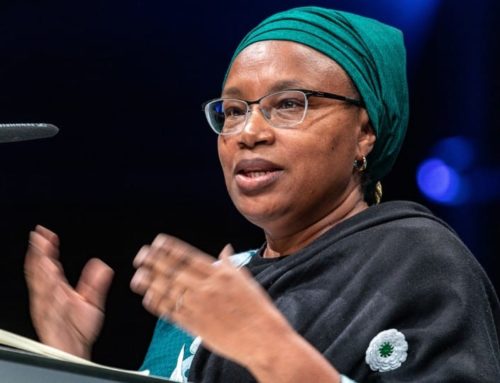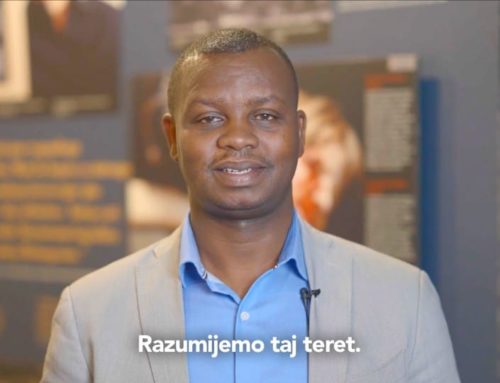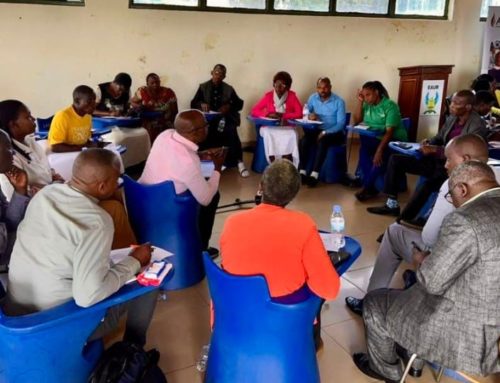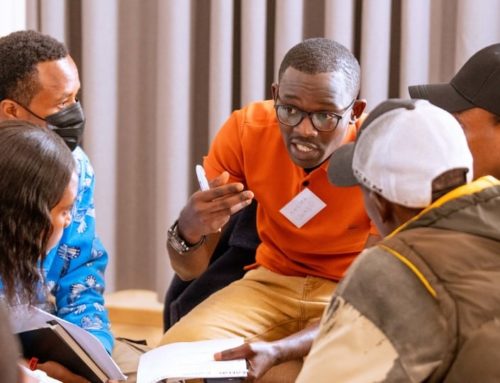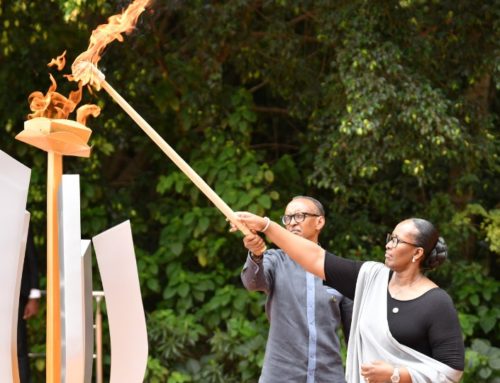During a recent visit to the UK to speak at a conference in London, Nicholas Aru Maan – co-founder of the South Sudan Youth, Peace and Development Organisation (SSYPADO) paid a visit to the UK’s National Holocaust Centre, birthplace of the Aegis Trust, and gave an on-camera interview about the life-saving impact of partnership with Aegis. “Aegis Trust and the Kigali Memorial Centre has been the force behind our continued hope for peacebuilding in South Sudan,” Nicholas says, describing how South Sudanese chiefs inspired by Aegis’ work in Rwanda had helped to reduce conflict by organizing young people to take part in education rather than fighting. “Lives have been saved,” he says, “and that is a preventive measure.”
Aru Maan was in London to speak at ‘Youth and Policy Engagement in the Horn of Africa’, a conference organised by Chatham House with the British Council, supported by funding from the European Union.
You can watch the interview here. A transcript follows.
Nicholas Aru Maan: interview with the Aegis Trust, March 2016
Aegis Trust and the Kigali Memorial Centre has been the force behind our continued hope for peace-building in South Sudan. If it has happened in Rwanda, it might happen in our country too, because we are so much divided.
“Forgiveness is healing.”
When I realised that Freddy himself, the [Aegis Trust’s] country director, was one of the survivors, and then he knew some of the people who killed his family members, I realised that forgiveness is healing. It makes you feel … free. When you forgive somebody. And that made me think of what can be done in South Sudan because there are so many out there who feel that forgiving cannot help.
When the conflict broke out [in 2013], the warring sides started mobilising the young people using traditional leaders. So we realised, the only way to at least do something, is to get these traditional leaders to Rwanda.
Changing attitudes
During the intergenerational dialogue there was this lady who hated Dinka so much in her heart. Now when we came to Rwanda, the good thing we started was to make people go through the Kigali Memorial Centre. They saw the skulls, they heard the history. The lady shed tears. She said, “When we arrived today, I did not have interest in speaking to any Dinka. But after I’ve listened to these stories, I have realised that we have innocent people here whom we are hating for nothing. And hate has led to genocide.”
Changing behaviour
And it was not only that lady; the participation in the intergenerational dialogue changed the behaviour of the chiefs who came. The chiefs went back to their villages, and they start telling people, “Whatever we are doing right now will not help us. We can mobilise our young people to fight, and they lose their lives. Why don’t we mobilise them to go to school?” The warring parties were realising that, oh, these chiefs, they want to think independently. It happened in Jonglei State, it happened in Upper Nile, and it happened in Bentiu.
By then Jonglei State comprised of the Nuer, the Murle, the Dinka – it was a very big state. Now the chief from that side refused to mobilise, because he saw this mobilisation may lead to genocide. And that caused him hatred. He was already hated by the – by those who wanted to use him. So he decided to say, if that is the case, he can resign from the work and you choose another chief, because he does not want to be part of the gathering storm.
Lives have been saved. And that is a preventive measure. See? It has helped.
Three important steps
One thing we need to do is to continue engaging young people in peacebuilding. And that is, I’m talking about peace education programme, which is supposed to be done in schools. We also need to continue with the intergenerational dialogue. Especially now the political environment in South Sudan is still not good, we can do it in neutral places like Kigali. And the third thing is the theatre arts. You know when you listen to stories of young people, then you take it to the stage in form of drama, and those stories can touch many audiences. Those who promote hatred will just feel it among the audience.
Reflections on visiting the UK’s National Holocaust Centre
I am inspired by the Holocaust Centre. First of all the idea is amazing. If it is something you could send through bluetooth to South Sudan, it can be a place where intergenerational dialogue, peace education, and this whole theatre thing I’ve been talking about can be done in that place. So… I did not talk about such an institution in South Sudan, because I am just imagining how much it cost to have it. But otherwise it is just the best thing to have.
Shaping the future
Our international community should do something to rescue our situation. Especially by empowering organisations like Aegis Trust. Because you have something which you can offer, if you can give it out today, tomorrow will be better. The generation which will come, will come and realise that there were people who contributed for their welfare. Thank you.
TRANSCRIPT ENDS
Nicholas Aru Maan’s UK visit was made possible by funding from the Swiss Embassy in Juba, which has also supported Aegis’ work in South Sudan, together with the Australian Embassy in Addis, Econet, the Diamond Family Foundation, and Jonathan and Summer Lang.

